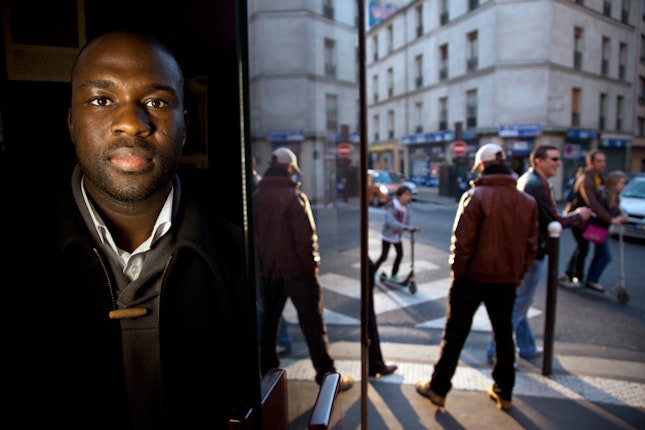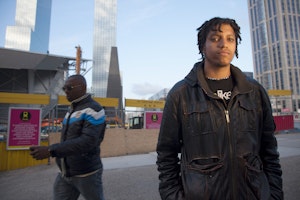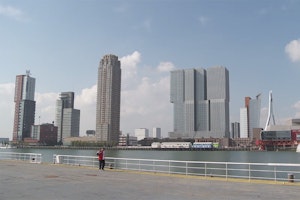Equality Betrayed: A Portrait Series
-
![Hicham Kochman (aka Axiom), artist, composer, and author in Lille: “Those who do not live with this, this harassment, don’t understand what we are talking about. They don’t know what it generates in oneself, on the level of one’s feelings, to be designated, to be second tier, third tier, told you are nothing and to shut up. In this way they make you believe that you are nothing and no one. It’s a daily, ongoing form of humiliation. They [the police] are armed, so this danger exists daily and you are insulted daily.” Photo credit: © Ed Kashi/VII for the Open Society Foundations A young man leaning against a wall](https://opensocietyfoundations.imgix.net/uploads/3d3138de-8e50-4d03-879c-6b0fc3040e6f/20120401-ekashi-ethnic-profiling-france-001.jpg?auto=compress%2Cformat&fit=min&fm=jpg&h=430&q=80&rect=0%2C0%2C675%2C450)
Hicham Kochman (aka Axiom), artist, composer, and author in Lille: “Those who do not live with this, this harassment, don’t understand what we are talking about. They don’t know what it generates in oneself, on the level of one’s feelings, to be designated, to be second tier, third tier, told you are nothing and to shut up. In this way they make you believe that you are nothing and no one. It’s a daily, ongoing form of humiliation. They [the police] are armed, so this danger exists daily and you are insulted daily.” © Ed Kashi/VII for the Open Society Foundations -

Achille Ndari, comedian and actor in Paris: “My first experience of an identity check was when I was in my first year of law school. When I got home, I raced up the stairs and lay on my bed and cried and cried, without fully understanding why, but I cried without being able to stop. I realized that what I was learning was out of sync with reality. I had always said to my close family that my skin color doesn’t exist, that it only exists for those that want to see it, but for me it doesn’t exist. My father raised me to think this way. But that day, I realized that something about me was different. I think that at that moment my faith as a ‘Dijonese’ citizen, my faith as a French citizen, disappeared, evaporated, dissolved.” © Ed Kashi/VII for the Open Society Foundations -

Adil Kochman, artist and filmmaker in Lille: “I can tell you about my first identity check as if it occurred yesterday: the exact route we took, why we went to the city center and the manner in which the police spoke to us. I think it’s something that remains etched in one’s mind for life. We are a generation that grew up in war, not a war involving bombs, but one with the police. It’s not normal. We don’t want to imagine a future in which we marry, have a house, and then have our children checked and go through the same things we have; it’s just not possible. It has to stop or it will lead to conflict.” © Ed Kashi/VII for the Open Society Foundations -

Lyes Kaouah, theatre student in Lyon: “When we walk in the city and we see the police, we feel unsafe. But there are other people for whom the police presence provides a sense ofsecurity. There are really two Frances. There is our France, the France of the poor suburbs, of immigrants, of persons of foreign origin, of the unemployed, and then there is the France of the others—those that feel reassured by police cars. When the police check us, stories of police brutality run through our minds and we say to ourselves, ‘It could be me.’ The older we get, the more we think about that.” © Ed Kashi/VII for the Open Society Foundations -

Omer Mas Capitolin, local council official in Paris: “When you are checked in public, it creates a really unpleasant image. I wonder what passersby think, whether they really think that I committed a crime or that I really did something illegal, especially when the check occurs in the neighborhood where I work. It’s especially the human effect it can have afterwards. An example that I find particularly striking is when I walk down the street and I passsomeone who shifts their bag to the other side—there is no mystery. I also try not to go to stores on Saturdays as I will likely be followed, be checked.” © Ed Kashi/VII for the Open Society Foundations -

Issa Coulibaly, community organizer in Paris: “What people do not understand about these abusive controls is that it’s real violence for those who are targets. The feeling of being treated differently, that’s the first reckoning, the first awareness of a certain discrimination, of some difference, of a certain exclusion. The influence and importance these police checks can have are very strong. Besides school and parents, they, the police, are the ones representing authority, and the checks can do a lot of damage to the perception young people have of authority. Trust is destroyed and distrust sets in. In addition, generalizing this, the police are the state, the police are the Republic, the nation. So the discriminatory policing damages one’s trust in institutions.” © Ed Kashi/VII for the Open Society Foundations -

Morad Aggoun, elected official and father of four in Lyon: “Because of the checks, at 20 we already thought like 40-year-olds. And that’s what I don’t want them to do to my son. I want my son to enjoy the time of his carefree days like other kids: to be full of dreams … I want my son to travel around the world; I don’t want him to be locked up inside himself because of identity checks that make him think that outside of his small neighborhood there is no life for him.” © Ed Kashi/VII for the Open Society Foundations -

Yannick Danio, police officer and police union representative in Paris: “A police force that has the population against it cannot work, it is not possible. Constant identity checks are counterproductive; us police officers, as well as experts, academics, and people who observe us all say it. It has no rhyme or reason. We need to reverse course and allow only justified identity checks and not identity checks by the shovelful. The National Police needs to work with the public; police working against citizens is the world upside-down.” © Ed Kashi/VII for the Open Society Foundations -

Said Kebbouche, community organizer and father of four in Lyon: “It is as if you did something wrong when the only thing wrong that you did was to be present. You feel that the simple fact of existing is a problem. When one hasn’t experienced this it is difficult to imagine the type of humiliation, to the point that it causes pain. There is even a feeling of humiliation when you are not checked yourself, but you know someone who is checked, even then it can cause pain. It’s something very intimate.” © Ed Kashi/VII for the Open Society Foundations -

Adji Ahoudian, local council official in Paris. Adji contrasts the excitement he felt when he first received the card that identified him as an elected official with the disillusionment of being singled out for an identity check. “You think to yourself, ‘Ho la la, this card is a sign of my full belonging to the French Republic.’ And then ‘poof,’ when that moment comes of an identity check, a familiar memory immediately rises to the surface. You realize that while you belong to the Republic and you live in the Republic, you aren’t actually a full citizen. You are a second-class citizen. You are continually reminded that due to your face, due to your skin color, due to your appearance that you are not really from here—even when you are an elected official of the Republic.” © Ed Kashi/VII for the Open Society Foundations
On the streets of Paris, a young black man can be six times as likely to be stopped and checked by the police as a young white man. For young males of Arab origin, the figure is even higher: They are at least eight times more likely to be stopped.
The French call it contrôle au faciès, which can be roughly translated as “being stopped because of the way you look.” It amounts to illegal discrimination.
But how does it feel? And what are the costs? In a new report, 13 young French people from minority communities talked to us about their experiences, together with two police officers who want things to change. Award-winning documentary photographer Ed Kashi took the pictures.
Topics


